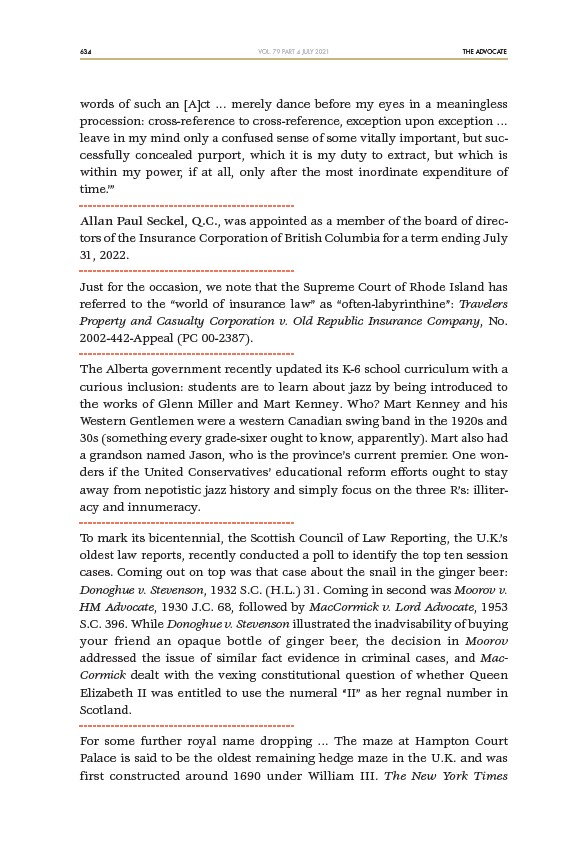
634 THE ADVOCATE
VOL. 79 PART 4 JULY 2021
words of such an Act … merely dance before my eyes in a meaningless
procession: cross-reference to cross-reference, exception upon exception …
leave in my mind only a confused sense of some vitally important, but successfully
concealed purport, which it is my duty to extract, but which is
within my power, if at all, only after the most inordinate expenditure of
time.’”
Allan Paul Seckel, Q.C., was appointed as a member of the board of directors
of the Insurance Corporation of British Columbia for a term ending July
31, 2022.
Just for the occasion, we note that the Supreme Court of Rhode Island has
referred to the “world of insurance law” as “often-labyrinthine”: Travelers
Property and Casualty Corporation v. Old Republic Insurance Company, No.
2002-442-Appeal (PC 00-2387).
The Alberta government recently updated its K-6 school curriculum with a
curious inclusion: students are to learn about jazz by being introduced to
the works of Glenn Miller and Mart Kenney. Who? Mart Kenney and his
Western Gentlemen were a western Canadian swing band in the 1920s and
30s (something every grade-sixer ought to know, apparently). Mart also had
a grandson named Jason, who is the province’s current premier. One wonders
if the United Conservatives’ educational reform efforts ought to stay
away from nepotistic jazz history and simply focus on the three R’s: illiteracy
and innumeracy.
To mark its bicentennial, the Scottish Council of Law Reporting, the U.K.’s
oldest law reports, recently conducted a poll to identify the top ten session
cases. Coming out on top was that case about the snail in the ginger beer:
Donoghue v. Stevenson, 1932 S.C. (H.L.) 31. Coming in second was Moorov v.
HM Advocate, 1930 J.C. 68, followed by MacCormick v. Lord Advocate, 1953
S.C. 396. While Donoghue v. Stevenson illustrated the inadvisability of buying
your friend an opaque bottle of ginger beer, the decision in Moorov
addressed the issue of similar fact evidence in criminal cases, and Mac-
Cormick dealt with the vexing constitutional question of whether Queen
Elizabeth II was entitled to use the numeral “II” as her regnal number in
Scotland.
For some further royal name dropping … The maze at Hampton Court
Palace is said to be the oldest remaining hedge maze in the U.K. and was
first constructed around 1690 under William III. The New York Times